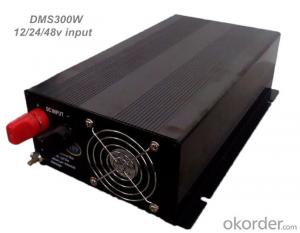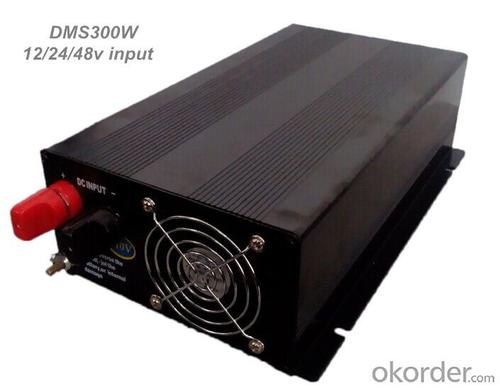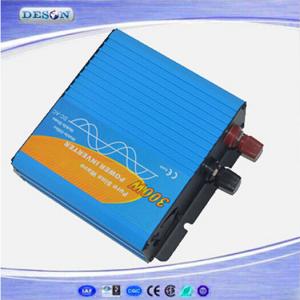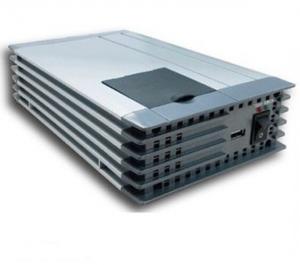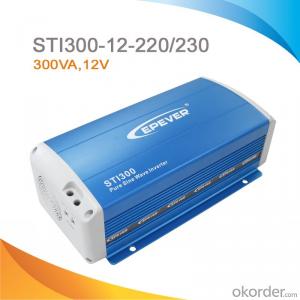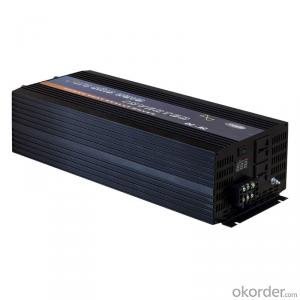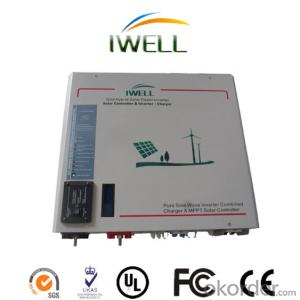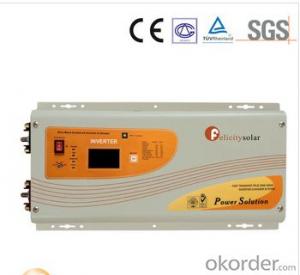Sirus Solar Energy Systems Pure Sine Wave Solar Inverter 300W High Efficiency 12V/24V/36V/48V Input
- Loading Port:
- Qingdao
- Payment Terms:
- TT or LC
- Min Order Qty:
- 1 pc
- Supply Capability:
- 800 pc/month
OKorder Service Pledge
OKorder Financial Service
You Might Also Like
Specifications
1.Pure sine wave output(<2%THD)
2.High Efficiency 87%-90%
3.High motor start driven force
4.Function of battery protection
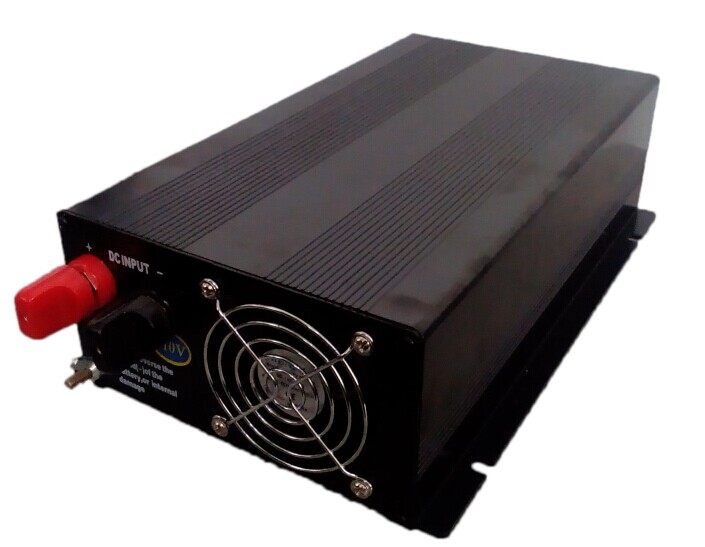
Product characteristic:
1.Pure sine wave output(<2%thd)< span="">
2.Input & Output fully isolation design
3.High Efficiency 87%-90%
4.High motor start driven force
5.5-stage thermal control fan
6.Function of battery protection
Technical Parameters:
Model | DMS300-12 | DMS300-24 | DMS300-36 | DMS300-48 |
Continuous output power | 300W | 300W | 300W | 300W |
Max power output | 320W | 320W | 320W | 320W |
Peak instantaneous power | 600W | 600W | 600W | 600W |
Conversion efficiency | ≥87% | |||
No -load current | 0.65A | 0.33A | 0.22A | 0.17A |
Output AC Voltage | 220/230/240/110/120/130V +5% | |||
Output wave form | Sine wave < 2%THD | |||
Frequency output | 50/60Hz+2% | |||
Input Dc Voltage | 10-16VDC | 20-30VDC | 30-45VDC | 40-60VDC |
Fault display | Red lamp flickers and buzzer alarms | |||
Working temperature | -20~55°C | |||
Function of protection | Alarm and protection in over loading, over voltage, low voltage, short circuit, over heating and converse connection, etc. | |||
Fan | Thermal control | |||
Product measurement(mm) | 265*140*81 | |||
Pack measurement(mm) | 340*165*140 | |||
Net weight | 2.6Kg | |||
Gross weight | 2.8Kg | |||
Application:
Electric tools:fretsaws, drills, mullers, grinder wheels, mowers, air compressors, etc.
Office equipment:computer, facsimile machines, scanners, etc.
Kitchen appliances:microwave oven, refrigerators, blenders, soybean juice machine, coffee makers, ovens, etc.
Lighting instruments: high pressure sodium lamp, compact fluorescent light, daylight lamp, halogen light, etc.
Home entertainment electronics:TV, blower, vacuum cleaners, fans, video games, musical instrument, charger, etc.
Payment Terms:
T/T, West Union,Money Gram, Paypal
Express Delivery:
EMS, DHL, FedEx, TNT, UPS
FAQ:
Q1:Can we visit your factory?
A1:Sure,welcome at any time,seeing is believing.
Q2:Which payment terms can you accept?
A2:T/T,L/C,Moneygram,Paypal are available for us.
- Q: What is the lifespan of solar inverters?
- Solar inverters can have varying lifespans, which are influenced by several factors. On average, most solar inverters last between 10 to 15 years. However, the quality, brand, and specific model of the inverter can impact its lifespan. Lower-quality inverters tend to have shorter lifespans, while higher-quality ones can endure for 20 years or more. To extend the lifespan of solar inverters, regular maintenance and proper installation are crucial. Keeping the inverter clean, free from dust or debris, and safeguarded from extreme weather conditions can help prolong its life. It's worth noting that although the inverter's lifespan may be shorter compared to the solar panels themselves, it can be replaced relatively easily without needing to replace the entire solar system. Furthermore, as inverter technology advances, upgrading to a newer and more efficient model becomes a possibility once the initial inverter reaches the end of its life. In conclusion, while the lifespan of solar inverters can differ, with adequate maintenance and high-quality equipment, they can deliver reliable performance for a significant duration.
- Q: Can solar energy systems be used in developing countries without access to reliable electricity?
- Yes, solar energy systems can be used in developing countries without access to reliable electricity. Solar power is a sustainable and renewable energy source that can be harnessed to provide electricity in areas where grid connectivity is limited or non-existent. By installing solar panels and utilizing energy storage systems, developing countries can generate their own clean and affordable electricity, reducing dependence on fossil fuels and improving the quality of life for their communities. Additionally, solar energy systems are relatively easy to install, require minimal maintenance, and have a long lifespan, making them a viable option for remote and rural areas in developing countries.
- Q: Can solar energy systems be used for powering electric scooter charging stations?
- Yes, solar energy systems can be used to power electric scooter charging stations. Solar panels can be installed on the roof or in an open area near the charging station to capture sunlight and convert it into electricity. This clean and renewable energy can be used to charge the scooters, reducing reliance on grid electricity and lowering carbon emissions. Additionally, solar energy systems can be combined with energy storage solutions, such as batteries, to store excess energy generated during the day for use during nighttime or cloudy periods. This ensures a continuous and reliable power supply for the charging stations. Overall, utilizing solar energy systems for electric scooter charging stations is a sustainable and environmentally-friendly solution.
- Q: Can solar energy systems be used in areas with high levels of hail or other severe weather conditions?
- Yes, solar energy systems can be used in areas with high levels of hail or other severe weather conditions. While severe weather conditions like hail can potentially damage solar panels, modern solar panels are designed to withstand various weather conditions, including hailstones of a certain size and velocity. Solar panels are typically made with durable materials such as tempered glass and are tested to withstand hailstones of a specific size and impact force. They are engineered to be strong enough to endure hailstorms without shattering or losing their efficiency. Additionally, solar panels are often installed at an angle to allow hailstones to slide off rather than directly impact the surface, further minimizing the risk of damage. Furthermore, advancements in solar technology have led to the development of more robust and resilient solar panels. For instance, some manufacturers offer panels with enhanced hail-resistant features, such as reinforced glass or protective coatings, to provide extra durability in areas prone to severe weather conditions. It is important to note that while solar panels can withstand hail, the severity and frequency of the hailstorms should be taken into consideration when planning and installing solar energy systems. Local weather patterns and historical data can help assess the risk level and determine the appropriate measures for protecting the panels, such as using hail guards or installing additional protective layers. In conclusion, solar energy systems can be used in areas with high levels of hail or other severe weather conditions as long as the panels are designed and installed to withstand such conditions. Proper planning, the use of resilient materials, and periodic maintenance can help ensure the long-term performance and durability of solar energy systems in these areas.
- Q: Can solar energy systems be used in powering wineries or breweries?
- Yes, solar energy systems can be used to power wineries or breweries. Solar panels can be installed on the roofs of the buildings or in nearby open areas to generate clean and renewable electricity. This can help wineries and breweries reduce their dependence on fossil fuels, lower their energy costs, and contribute to a more sustainable and environmentally-friendly operation.
- Q: What is the role of charge controllers in a solar energy system?
- The role of charge controllers in a solar energy system is to regulate and control the flow of electricity between the solar panels and the batteries. They prevent overcharging of batteries by regulating the voltage and current, which helps prolong the battery's lifespan and ensures efficient and safe operation of the entire system.
- Q: Can solar energy systems be used for powering off-grid weather monitoring stations?
- Yes, solar energy systems can be used for powering off-grid weather monitoring stations. Solar panels can capture sunlight and convert it into electricity, which can then be stored in batteries for use during cloudy days or at night. This allows weather monitoring stations to operate independently without relying on a grid connection for power supply.
- Q: Can solar energy systems be used in areas with limited access to healthcare?
- Indeed, areas with limited access to healthcare can definitely benefit from the use of solar energy systems. In fact, the utilization of solar energy systems can play a vital role in enhancing healthcare services in such areas. Solar energy systems have the capability to provide power to medical facilities, including hospitals, clinics, and health centers, ensuring a consistent and uninterrupted supply of electricity. This becomes particularly significant in remote or off-grid locations where the availability of power from the main grid is scarce or non-existent. By offering a sustainable and autonomous energy source, solar systems can help overcome the obstacles caused by unreliable or inadequate power supply, which often hinder the provision of healthcare services. The use of solar energy can enable the powering of essential medical equipment, such as diagnostic tools, laboratory machines, and refrigeration units for storing vaccines and medications. This empowers healthcare providers to deliver crucial services, including diagnostics, treatment, and emergency care, even in areas where conventional power sources are limited. Additionally, solar-powered medical equipment can be easily transported and mobile, facilitating healthcare workers' access to remote areas and allowing them to provide primary healthcare services to underserved populations. Furthermore, solar energy systems can be employed to provide lighting in healthcare facilities, especially in areas where electricity is scarce or unavailable during nighttime. Sufficient lighting is vital for performing medical procedures, conducting surgeries, and delivering babies safely. Consequently, solar-powered lighting systems can contribute to the overall well-being of healthcare workers, enabling them to work in well-illuminated and comfortable environments. Moreover, solar energy systems can power communication devices, such as phones and radios, empowering healthcare workers to connect with experts and access medical information, even in areas with limited connectivity. This can facilitate telemedicine initiatives, where healthcare professionals can conduct remote consultations and diagnosis, further enhancing healthcare access in areas with limited healthcare infrastructure. In conclusion, solar energy systems provide a sustainable and dependable solution for powering healthcare facilities and enhancing healthcare services in areas with limited access to healthcare. By supplying electricity to medical equipment, lighting, and communication devices, solar systems can contribute to improved healthcare outcomes, increased efficiency, and enhanced accessibility to vital medical services in underserved communities.
- Q: How long does it take to install a solar energy system?
- The time it takes to install a solar energy system can vary depending on various factors such as the size and complexity of the system, the availability of equipment and materials, and the experience of the installation team. Generally, a residential solar energy system installation can take anywhere from a few days to a few weeks, while larger commercial installations may take several weeks or even months. It is recommended to consult with a professional solar installer to get a more accurate estimate based on your specific requirements.
- Q: How do solar energy systems affect the electrical wiring of a building?
- Solar energy systems can have an impact on the electrical wiring of a building, as they typically require the installation of new wiring to connect the solar panels to the building's electrical system. This involves adding a new circuit breaker and running wires from the panels to the building's main electrical panel. However, the overall effect on the existing electrical wiring is minimal, as the solar energy system operates independently and does not interfere with the normal functioning of the building's electrical system.
Send your message to us
Sirus Solar Energy Systems Pure Sine Wave Solar Inverter 300W High Efficiency 12V/24V/36V/48V Input
- Loading Port:
- Qingdao
- Payment Terms:
- TT or LC
- Min Order Qty:
- 1 pc
- Supply Capability:
- 800 pc/month
OKorder Service Pledge
OKorder Financial Service
Similar products
Hot products
Hot Searches
Related keywords
